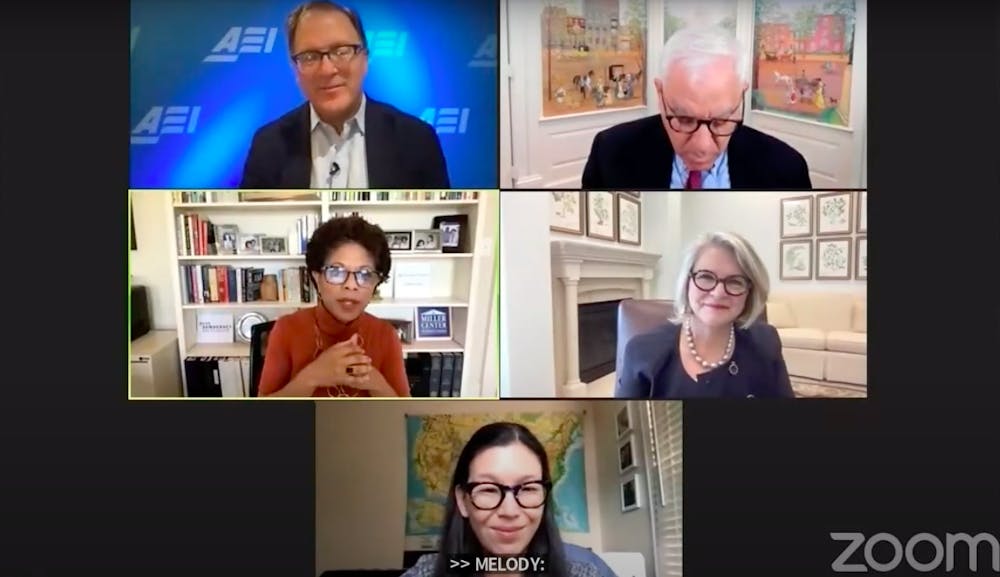The University’s Miller Center and Democracy Initiative hosted a roundtable discussion on economic mobility and the American dream as a part of its Democracy Biennial Celebration Saturday afternoon. The conversation framed the conversation around America’s economy following the economic contraction due to the COVID-19 pandemic and whether the federal government’s response perhaps plots a better path towards economic stability for many Americans.
Melody Barnes, director of the Karsh Institute of Democracy and co-director of the Democracy Initiative, moderated the conversation. Panelists included Robert Doar, president of American Enterprise Institute; David Rubenstein, co-founder and co-chairman of The Carlyle Group; Ai-jen Poo, executive director of National Domestic Workers Alliance; Margaret Spellings, president and chief executive officer of Texas 2036 and former secretary of education during the George W. Bush administration; Karin Lips from Network of Enlightened Women and Rashad Robinson, president of Color of Change.
Throughout the discussion, Barnes posed questions to panelists regarding the reality of the American dream in 2021, the causes of economic stagnation and how to move into a society where economic mobility is fruitful.
Barnes opened the discussion by defining the American dream, explaining that most Americans traditionally view success and achievement in material terms. Using this definition, the panelists debated whether the American dream exists — and whether economic mobility is truly attainable -— today.
“Today, the American dream and the way we talk about it typically connotes a materially abundant life,” Barnes said. “It is owning a car, a house, it is being able to send your children to college while finding your way to a restful retirement.”
Panelists weighed in on the current challenges workers confront in the workforce and in society more broadly that make economic mobility unattainable, such as stagnant wages, increasing costs of living and staggering student debt.
Low-wage service workers were hit the hardest by the COVID-19 pandemic — wages stagnated and low-wage workers were laid off most frequently, with a 39.3 percent unemployment rate for hospitality workers and 17.3 percent unemployment rate for retail workers. Bureau of Labor Statistics reports also confirm that inflation has increased at minimum one percent in the last year, raising the cost of essentials such as groceries or gas and hitting low-income workers.
Barnes then posed to panelists that they may account for wavering faith in the American dream, particularly among millennial and low-income Americans. Rubenstein responded with her belief that the cause is a growing disconnect between ideals of economic mobility and the reality of a lack of movement between classes, namely due to increasing differences in education and skills among different social classes.
“Here, more than any other country in the world, the idea that people could rise up in their modest circumstances and get to the top through achievement and hard work is something that is a part of our ethos,” Rubenstein said. “Sadly … more and more people in the bottom economic and social strata … seem to be accepting the notion that they can’t rise up.”
Many of the Americans losing faith in the American dream, the panelists observed, are unskilled, minimally-educated individuals. The panelists framed ongoing poverty and a lack of economic mobility in America today as a symptom of America’s ailing education system. Panelists viewed better education as an impetus for better economic outcomes and mobility.
Spellings made specific reference to how the COVID-19 pandemic resulted in students falling a year behind in their education, suggesting that there will likely be dire economic consequences as a result. All panelists noted that, in their views, educated citizens become civically-engaged citizens.
“The urgent crisis is now that our schoolchildren are a year behind in learning and we have to have a triage sense of urgency around those issues,” Spellings said. “[These] are the kinds of things that are happening today that are going to pay in multiples when students are chronically behind for the rest of their work lives and civil lives.”
Poo called for new labor laws to fit the economic transformations in the U.S. over the past century, noting that the economy has largely become service-based. Poo said that laws need to account for temporary, self-employed workers and independent contractors and allow these non-traditional workers to reap the benefits of America’s safety net. If laws granted greater access to social safety net programs for service-based workers, those employees would experience greater economic stability and thus have higher potential for mobility, Poo said.
Poo mentioned President Joe Biden’s Build Back Better Agenda as a method of passing budgetary laws through reconciliation to enable more Americans to achieve economic stability by providing more good-paying quality jobs for many Americans. Biden’s agenda includes three hallmark pieces of legislation that the White House hopes to pass during his time in office — the American Rescue Plan, which passed in March 2021, the American Families Plan and American Jobs Plan.
The panel also discussed the national debate surrounding voting rights after the recent passage of a new voting rights bill curtailing early voting options in Texas following widespread voter fraud allegations in the 2020 presidential election. Expanding and protecting early voting and mail-in voting is necessary to keep many low-income workers — particularly home care workers — civically engaged, Poo said, as many of these workers do not have many time off or child care.
“All of these things, when you are low-income in a job with no job security or paid time off which is many, many jobs in this country that women, women of color hold, there are just a lot of practical challenges,” Poo said. “So, when you start to do away with early voting, vote by mail, other kinds of mechanisms that have expanded our ability to participate in our democratic process over time, it just makes it harder for women that I work with to vote.”
As the discussion closed, Poo encouraged audience members to think about how much creativity, talent and brilliance is “left on the table” because of these inequities.





